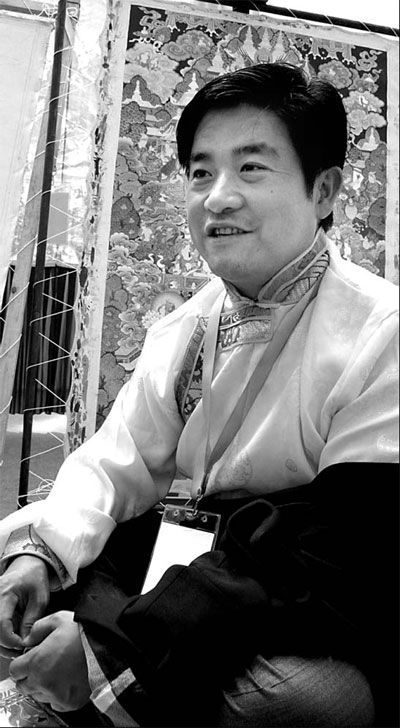Grasping the intangible
While a UNESCO listing is giving a big push to the preservation of traditional arts and crafts, fewer youngsters are taking to them.
 |
|
Thangka artist Quzhi at the "Exhibition of 100 Masters of Arts and Crafts" in Beijing to mark the "Day of Cultural Heritage". [China Daily] |
Quzhi has been seen his business boom in recent days, with the price of his thangka (traditional Tibetan paintings) doubling since the second half of last year.
The artist says works that used to sell for 40,000 ($5,860) to 50,000 yuan a piece now sell for 90,000 to 100,000 yuan.
The change took place after Regong Arts, a term covering the painting, barbola patchwork embroidery and sculpting of the Regong area in Qinghai province, was inscribed on UNESCO's representative list of the Intangible Cultural Heritage of Humanity, last September.
"Our sales have been increasing rapidly since then, with more people becoming aware of Regong Arts and thangka," says Quzhi, who is in Beijing to participate in the "Exhibition of 100 Masters of Arts and Crafts", that ends at the Beijing Exhibition Hall today.
"Both experts and big bosses are now collecting our works."
In Quzhi's home of Wutun village, Tongren county, Qinghai, roughly half the 2,000-plus residents work as thangka painters, a tradition that dates back centuries.
The Wutun Snowland Art Center, a company owned by Quzhi and his brother Zhaxi Jiancuo, is also a training center for thangka painting and currently has 156 students. It takes up to nine years to master this art and become a professional painter. Quzhi says that he has more students now than in the past.
It is the same with the celadon of Longquan, Zhejiang province, the traditional firing technique which was also listed as a masterpiece of UNESCO's Intangible Cultural Heritage of Humanity last year. About 200 new celadon workshops have appeared in the city since the second half of last year, taking their total number to more than 500, according to Xiahou Wen, who owns one of them.
"In the past, people were more familiar with the celadon of Jingdezhen. Now that Longquan is better known, there is more investment in Longquan so that its special firing technique can be better preserved," Xiahou says.
So far 29 items from China have made it to UNESCO's list of Intangible Cultural Heritage, including Kunqu Opera, Chinese calligraphy, and the dragon boat festival.
China's classification of its intangible cultural heritage goes from national to county level. Since 2006 when the second Saturday of June was named "Day of Cultural Heritage", various activities to promote the nation's rich cultural heritage take place on and around this day.
This year, on June 12, farmer-musicians from Qujiaying village of Hebei province traveled to the Temple of Heaven in Beijing and held a concert of the traditional blown music of Hebei.
Zhonghong Jiye, a real estate company of Hebei and organizer of the concert, has invested millions of yuan to refurbish the musicians' rehearsal hall and rebuild the road to Qujiaying village. The company also plans to build the village into a tourist site where urban residents can pick fruits, take baths in a hot spring, and enjoy the local farmers' music.
However, Lin Zhongshu, head of the music association of Qujiaying village, contends that although intangible cultural heritage has received more attention in recent years, its reach is limited and has few takers.
At his village, fewer youngsters are studying traditional music because it is not seen as lucrative.
Jin Wen, a master craftsman of Nanjing Yunjin brocade, which was also included in the UNESCO list last year, wants the government to come up with new policies that will help preserve China's intangible cultural heritage.
"I hope the government will subsidize people who study traditional arts and crafts, which is often not very profitable," he says. "Without proper education and transmission, it is hard to build a good future for China's intangible cultural heritage."
 0
0 






